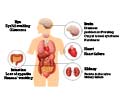Small clusters of amyloid beta, not plaques, could be behind brain damage in Alzheimer’s disease.
Small clusters of amyloid beta protein, not plaques, could be behind brain damage in Alzheimer’s disease.
Clusters of just two or three amyloid beta molecules can damage synapses, the connections between brain cells. Plaques, much larger groupings made up of millions of cells, are not nearly as harmful as the small clusters, said scientists at the annual meeting of the Society for Neuroscience in Washington D.C.Until the past couple of years, amyloid beta plaques were considered the most likely cause of Alzheimer's brain damage.
But Dennis Selkoe, a professor of neurology at Harvard Medical School, said the new findings suggest that hypothesis is wrong.
He presented research using various forms of amyloid beta protein taken from the brains of people with Alzheimer's disease. The proteins were injected into the brains of healthy rats.
Selkoe said entire plaques did not affect synapses. Neither did single proteins.
"But you could inject the doublets and triplets into the brain of a healthy rat and show that the rat got forgetful," Selkoe said.
Advertisement
Frida Ekholm Pettersson of Uppsala University in Sweden says her team found no clusters in healthy brains.
Advertisement
Donna Wilcock described an experiment using a new mouse model of Alzheimer's created by a colleague at Duke. The mice develop a memory problem very much the way people with Alzheimer's do.
But when the mice received a vaccine against amyloid beta, their memory improved.
Wilcock says the approach may work because it causes the body's immune system to attack all forms of amyloid beta — including small clusters.
Scientists are trying a similar approach in people.
Source-Medindia
GPL/SK













